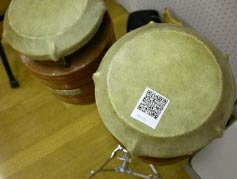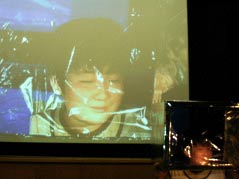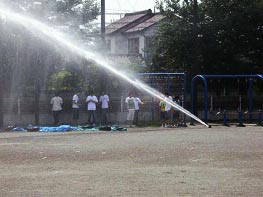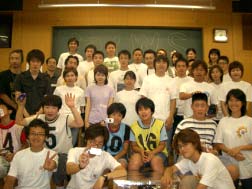|
||||
| 1. | Opening: 9:00 am - 9:30 am |
| 2. | Talking Objects: 9:30 am - 10:00 am In this activity, children utilize two-dimensional bar codes that are recognized by mobile phones (QR codes) to make various objects in the elementary school send messages. Children move around the classrooms with student staff members to try to find objects (such as chairs and musical instruments) that they want to make talk. Then, children record a voice message by mobile phone that imagines what the object wants to say. (See photo.)  |
| 3. | Parallel Tag 1st Round: 10:00 am - 10:30 am Parallel Tag is the Tag of the Future. Each player has a mobile phone with camera and live image capability, and plays tag by using the live video image as a clue while doing multipoint videoconferencing with "it" and other players. |
| 4. | Talking Objects [listening to the voice of an object]: 10:30 am - 11:00 am The QR code label created during activity 2 is applied to an object. Children search for a QR code label in the room and empathetically listen to the messages that express other children's feelings and thoughts. |
| 5. | Future Television: 11:00 am - 11:30 am Children appear on an imaginative program on future TV, and send a message to themselves in the future. Each child enters into the television box and talks to himself/herself. (See photo)  |
| 6. | Parallel Tag 2nd Round: 11:30 am - 12:00 pm Teams are shuffled and play another round. |
| 7. | Lunchtime: 12:00 pm - 1:00 pm |
| 8. | Feel-Cool Laboratory [sound sampling]: 1:00 pm - 2:30 pm This activity is a program of sound sampling and editing. Children search the school grounds for the sounds that impart a cool feeling. They then sample the sounds with IC recorders and edit them to compose original music. Children also shoot the scenery of the source music using a Polaroid camera. (See photo.)  |
| 9. | Feel-Cool Laboratory [music composition]: 2:30 pm - 3:30 pm Children edit sounds with sound editing software called "ACID". Once the sound is edited, children present their work showing materials including the Polaroid photographs that they took earlier. |
| 10. | Feel-Cool Laboratory [remix]: 3:30 pm - 4:30 pm This time, children mix the sound composed by another group, and present the remixed work. |
| 11. | Ending: 4:30 pm - 5:00 pm Children participate in a feedback session. The video of an entire workshop shot by the staff members is shown at the end.  |
|
||
In the Future Experience Workshop, children took part in various totally new activities organized by university students and adults. The workshop was not passive activity that simply presented the children with a future imagined by adults. For example, when children started playing Parallel Tag using mobile videophones, they followed the staff's instructions and used videophones as auxiliary devices for playing tag. However, as they got used to this new media, children gradually and voluntarily invented a new playing method and strategies that made the best use of its characteristics. Moreover, at the last stage of play, the original tag was transformed into quite new play that absolutely required mobile videophones. The children's unique way of creating meaning for mobile videophones far exceeded adults' expectations.
The fact that children were able to enjoy Parallel Tag is largely attributed to the environment of this elementary school, because the place was familiar to the children. Like other traditional play such as "cops and robbers" and "kick-the-can," tag is usually played in a familiar living environment. Children acquire a sense of the geography of their living environment through the play of chasing their friends and hiding from them. Chasing and running are able to exist as play because of this sense of geography. Parallel Tag, however, requires children to determine where the "it" is by using videophone in addition to hiding or running from "it" inside their familiar school grounds. In this case, children cannot guess where the "it" is unless they integrate the information provided by the live image on a videophone and their memories of the map of the school ground, and that is the most vital aspect of Parallel Tag. Children in the future may acquire different senses of geography and reasoning ability through play.
Future experience using media is not limited to visual information such as images. "Feel-cool" laboratory addresses the possibility of media's stimulating children's sense of hearing and nurturing their sensitivity to sound. This activity starts from sampling natural and artificial sounds by IC recorders on the school grounds as well as in the school building. Children's own voices and chats with friends are also subjects for recording. Children realize that there are various sources of sound including human bodies within the elementary school. The sounds collected from the environment are mixed with a certain rhythm and melody. It is surprising not only for children but also for adults when discrete sound changes into music with feeling of happiness and loneliness. The borderline between information media and musical equipment has become fuzzy these days. New teaching methods can therefore be established for music education concerning how to nurture sensitivity and how to express feelings.
In this changing era, the introduction of new information media is not the only factor for promoting children's acquisition of new senses and skills. The traditional scheme is also about to change in business and political worlds as well as in the relationship with family members and neighbors. In the stable past, the main educational role was to pass values and behaviors on to the next generation. However, today's society has changed significantly due to the reciprocal influence of the media, environment, values and human behavior. Therefore, the relationship between learners and teachers of information and culture must be more flexible according to the change in content to be conveyed.
In the Future Experience Workshop, children were not treated as subjects to be taught or "guests" of the event. Rather, staff members and adults approached children in hope of learning something from them. In fact, children's behaviors and expressions were sometimes far removed from what the staff and adults expected. Was it because the children's reactions were "wrong"? Was it the adult's approach that was the problem? Shall we consider it a creative adjustment towards a new social environment? We cannot easily reach a conclusion. At the same time, we must be careful when imparting common sense notions or expectations of the preceding generation. The assisting students, who took a leading role in the planning and implementation of the workshop, are also in a position to lot to learn from previous generations. To them, this workshop might be the experience of sending a message to the children of the next generation, and a good chance to re-consider their own values and awareness.
When the overall theme of Future Experience Workshop was examined, staff members discussed what kind of "future" they wanted children to experience. For some staff members, the future is a vision that people haven't experienced before but can predict, at least, in a small part, by utilizing information media. For others, it is a way that adults can explain advanced activities to children in simpler ways. Still for others, the future cannot be realized through various images in the first place, but is established as an accumulation of everyday life without individual intention. Staff members also insisted that we should give children a chance to think about their future on their own, not based on adults' images of the future. In this event, we did not choose one from among the various ideas of the future, but integrated each thought. There were some gaps in perceptions and values among staff members. There were times when they got confused and experienced dissension at the preparation stage. However, no matter how people perceive the future, we will eventually face a society that consists of different generations with diverse values. Therefore, it certainly is enormously significant that people of different generations share the same "future experience," feel, think, learn together and teach one another.
(Masanao Takeyama, Associate Professor, Department of Economics, Keio University)














